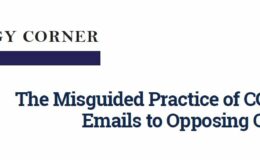As has been recently well-hyped, there are certain restrictions on Florida judge’s use of social networks. It apparently took awhile for everyone to notice a November 17 Judicial Ethics Advisory Committee report but once the New York Times got a hold of it nearly a month later on December 10, the Florida media kicked it into gear with front page coverage the next day in the Daily Business Review (and other publications). But South Carolina had quietly already jumped into the fray.
While we were expecting some evidence of Internet fear and misunderstanding, both panels appear to have a reasonable grasp on both the zeitgeist of the new media and the purpose of arcane legal rules.
According to Florida JEAC, judges are not supposed to openly “select” and identify friends since the concern is that this creates the appearance that the “friend” sits in a special position. A minority on the panel apparently felt that the word “friend” has been bent so far (from noun to verb to… nothing) that the implication isn’t there. However, consider a situation where you are first appearing before a judge only to learn that your jurist is a (published) Facebook friend of your opponent. Depending upon how heated your case gets, the ugly implication will roost somewhere in your mind. Or your client’s.
Anyone can be a “fan” of a judge’s page since that does not involve the jurist making a selection. Again, as the committee wrote, “to the extent that such [“friending”] identification is available for another person to view, the committee concludes that this practice would violate [judicial rules].”
If it sounds a bit heavy-handed, judges knew going into their situation that they would suffer some unusual social burdens and restrictions, as warned under Canon 5a. Likely, there are far more sticky situations than Facebook.
But, judges can be friends with non-lawyers and lawyers who do not appear before them. Additionally, judges can be associated with lawyers in other Internet groups, as long as the judge is not selecting/de-selecting the public association.
The South Carolina Judicial Department likewise has some opinions. In their October 2009 opinion, which received virtually no press until after the Florida story broke, judges may be members of Facebook and be friends with law enforcement officers and employees of the Magistrate as long as they do not discuss anything related to the judge’s position.
How did Florida and South Carolina beat everyone to the punch on these techno-legal issue? One would expect New York or California on the cusp of this one.


